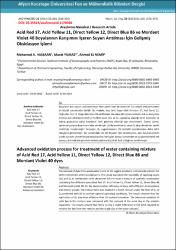Advanced oxidation process for treatment of water containing mixture of acid red 17, acid yellow 11, direct yellow 12, direct blue 86 and mordant violet 40 dyes
Citation
Hassaan, M. A. , Yılmaz, M. & El Nemr, A. (2023). Advanced oxidation process for treatment of water containing mixture of Acid Red 17, Acid Yellow 11, Direct Yellow 12, Direct Blue 86 and Mordant Violet 40 dyes . Afyon Kocatepe Üniversitesi Fen Ve Mühendislik Bilimleri Dergisi , 23 (2) , 326-335 . DOI: 10.35414/akufemubid.1170648Abstract
Boyaların atık sudan uzaklaştırılması hem çevre hem de üreticiler için tekstil endüstrisindekien büyük sorunlardan biridir. Bu makale, beş farklı boya (Asit Kırmızısı 17, Asit Sarısı 11,Doğrudan Sarı 12, Doğrudan Mavi 86 ve Mordan Menekşe 40) içeren sentetik atık su karışımınıarıtmak için ultraviyole (UV) ile birlikte ozon (O3) ve O3 uygulama olasılığı farklı kromofor veankraj gruplarına sahip boyaların renk giderme etkinliği için incelemiştir. Temas süresi,optimum çalışma koşullarını elde etmek için UV ile kombine O3 veya O3 akışı altında bir kesiklireaktörde incelenmiştir. Sonuçlar, O3 uygulamasının UV destekli ozonlamadan daha etkiliolduğunu göstermiştir. Bu karışımdaki her bir boyanın ileri oksidasyonu, aynı boyanın çözeltiiçinde ayrı ayrı çıkarılmasıyla karşılaştırıldı. Sonuçlar, boyayı karışımdan ve su çözeltisindeki tekboyayı çıkarmak için gereken sürede yalnızca küçük bir fark olduğunu kanıtlamıştır. The removal of dyes from wastewater is one of the biggest problems in the textile industry for both environment and manufacturers. This study examined the possibility of applying ozone (O3) and O3 in combination with ultraviolet (UV) to treat a mixture of synthetic wastewater containing five different dyes (Acid Red 17, Acid Yellow 11, Direct Yellow 12, Direct Blue 86 and Mordant Violet 40) for the decolorization efficiency of dyes with different chromophore and anchor groups. The contact time was studied in a batch reactor under the flow of O3 or O3 combined with UV to achieve optimal operating conditions. The results showed that the application of O3 was more effective than UV-assisted ozonation. The advanced oxidation of each dye in this mixture was compared with the removal of the same dye in the solution separately. The results proved that there is only a slight difference in the time required to remove the dye from the mixture and the single dye in the water solution.
Source
Afyon Kocatepe Üniversitesi Fen ve Mühendislik Bilimleri DergisiVolume
23Issue
2URI
https://doi.org/10.35414/akufemubid.1170648https://dergipark.org.tr/tr/download/article-file/2631007
https://hdl.handle.net/11630/11300
Collections
- Cilt 23 : Sayı 2 [25]



















